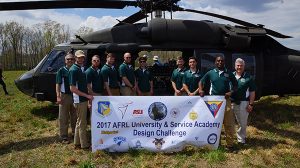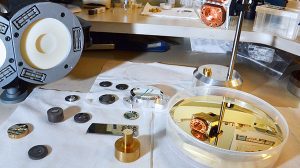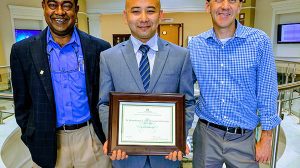News

To learn more about manufacturing and metrology, and then be able to take that knowledge back to their area of the country to share, two students from Navajo Technical University’s Crownpoint, New Mexico, campus spent the summer at UNC Charlotte’s Center for Precision Metrology.
In fiscal year 2017, UNC Charlotte recorded its highest ever total of sponsored research awards in the amount of $50,917,579, according to the Office of Research and Economic Development report of sponsored awards for July 1, 2016, to June 30, 2017.
The National Science Foundation has awarded a three-year $600,000 grant to UNC Charlotte Electrical and Computer Engineering Department researchers for the project “Intelligent Energy Efficient Spectrum Access for Wireless IoT.” The principal investigator for the project will be Dr. Jiang (Linda) Xie. The co-principal investigators will be Dr. Tao Han and Dr. Thomas Weldon.
Charlotte Banks, a regional research initiative led by Dr. Gloria Elliott of Mechanical Engineering and Engineering Science at UNC Charlotte focused on making more organs available for transplant, is the topic on this video edition of “Inside UNC Charlotte.”

Participating in the U.S. Air Force Research Laboratory’s 2017 University Design Challenge, a team of UNC Charlotte engineering students received honorable mention for its ‘navigation intent and size/form factor’ work. The purposed of the competition was to help the Air Force solve a critical problem for the nation’s military and Special Operations community.

UNC Charlotte researchers have worked in the field of freeform optics for more than 10 years. In that time, numerous advances have been made that are now creating a whole new world of optical applications and fundamentally changing the way optical devices are designed. Undergraduate students, graduate students and alumni from the Lee College of Engineering and the College of Liberal Arts and Sciences are working collaboratively on research and application of these new technologies.

Through his undergraduate studies, senior design project, graduate thesis, summer internships, a job and now a position as a research faculty member, the one constant for Dr. Joseph Owen has been freeform optics. He has learned about them, made them, applied them, measured them and is now researching how to advance them to the next level.

Arnab Baruah was recently announced as the first recipient of the Bharatkumar S. Joshi Memorial Scholarship, named in memory of Associate Professor Dr. Bharatkumar S. Joshi of the William States Lee College of Engineering.

Future space missions will reach greater distances and span longer durations. Design of spacecraft and habitats to better accommodate habitability functions will be more important than ever. To achieve this, mission planners and spacecraft designers now need tools to help them better define habitable volume and identify mission and programmatic risks. Volume directly drives mass and cost, so well-informed estimates early in the design process are key.

Established in December 2016, the Center for Advanced Multimodal Mobility Solutions and Education (CAMMSE) is now up and running with numerous projects underway. UNC Charlotte is the lead in the multi-institutional initiative, which is funded by a $7.7 million grant from the U.S. Department of Transportation.